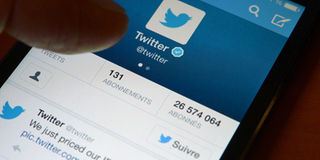Local users crowd Twitter, Facebook but caution a must

A Twitter account. Social media can offer a cost effective platform for marketing products. PHOTO/FILE
What you need to know:
- Former president Mwai Kibaki lauded the usage of the social media platforms in the country saying it had helped propel the freedom of expression.
- Several Kenyans have been arrested for posting hate messages on Twitter and Facebook that perpetrated ethnic vitriol.
- The social media platforms can be utilised to create cost effective strategies and campaigns that can go viral within a short period of time.
Last year, Kenyans were ranked among top users of social media networks in Africa.
Former president Mwai Kibaki lauded the usage of the social media platforms in the country saying it had helped propel the freedom of expression.
Kenya ranked second in use of Twitter after South Africa. On Facebook use, the country held the seventh position with 2 million users after Egypt that had 9.5 million users.
Other African countries leading in use of social networks at the time were Morocco, Algeria, Nigeria and Tunisia.
Credits for a revolutionized way of sharing information are solely owed to rapid technological developments experienced in the country.
The arrival of undersea fibre optic cables in Kenya meant cheaper and faster internet connections.
“Technology has enabled innovation of new ways that enable faster communication as well as sharing of information and knowledge,” Kibaki told a convention of journalists at KICC in Nairobi in May 2012.
In the recent past, Kenya has been overflowing with mobile phones that are internet enabled. Most mobile phones come with the android support platform that is convenient in information sharing through the Internet.
The mobile phones fast displaced land lines which were restrictive due to their immobility. On the other hand, they lacked diversity and users were limited to simply making and receiving calls.
The advent of mobile phone usage in the country came with such convenience that it was liked by both young and old.
It is easier to access firsthand information through the mobile phone platform as compared to a desktop computer or laptop.
Breaking news goes viral on social media, thanks to availability of mobile phones to a huge chunk of Kenyans.
Social media can be defined as the collective online communications channels dedicated to community-based input, interaction and collaboration.
It is a revolution of the 21st century and only a minimal portion of Kenyans are not plugged into social media.
This, however, has its merits and demerits alike. This means there are some habits that should be avoided while engaging others in conversations online since you never know who might be watching or reading.
Hate messages
Social networking is a tool in making new friends as well as enemies.
Abusive updates on a given social media platform might feel sweet for the person posting them but they have bitter consequences.
Several Kenyans have been arrested for posting hate messages on Twitter and Facebook that perpetrated ethnic vitriol.
In the days after the March 4 General Election, a few malicious individuals hid behind anonymity in social media to attack their purported enemies.
Such individuals would vent their venom in social forums, frustrating the government’s effort in ensuring cohesiveness among citizens.
Noting the impact of the social media platforms, Bishop Martin Kivuva of the Machakos Diocese last May hinted that Catholic bishops would open Facebook and Twitter accounts.
This would be in an effort to ensure the presence of sober debate, and not the ethnic hate being peddled.
Another demerit of online social networks is that unauthorized persons may access information classified as private.
For instance, in the heat of the moment, lovers may take nude photos of themselves and it only takes one mistake for the photos to resurface in the wrong place, through the social media.
Instagram, Facebook and Twitter have share options that can make the photos go viral within no time.
In August 2012, ‘Kitu Kimoja’ singer Avril became the talk of town after her nude pictures circulated on the Internet and suddenly everyone knew who she was.
Worker productivity can be maimed, thanks to the negative impacts of social media usage.
Employees can waste valuable time engaging in conversations on popular sites such as Wassup, Facebook, Myspace and Tagged thus failing to meet deadlines.
With proliferation of social media platforms, parents are having a hard time controlling what kind of information their children view online.
Parents can never be sure who their kids chat with online. Since the children are at an impressionable age, paedophiles and other maniacs can take advantage of them on sites such as Meetup and Facebook.
Renowned bloggers depend on social media platforms to drive traffic on their sites.
What the bloggers do is post a link on say Twitter and online friends can follow up the link to their blogs.
Journalists, on the other hand, share their published stories on their Linkedin and Facebook pages just to increase readership.
The more an article is read the higher the rating of the writer.
Social media platforms have transformed the world into the global village it is today.
While the Web has always provided a way for people to make connections with one another, social networking sites made it easier than ever to find old friends and make new ones.
Today, it is rare to find someone who has not at least heard of Facebook, MySpace, Twitter or one of a hundred other social networks.
Social media can offer a cost effective platform for marketing products.
The social media platforms can be utilised to create cost effective strategies and campaigns that can go viral within a short period of time.



